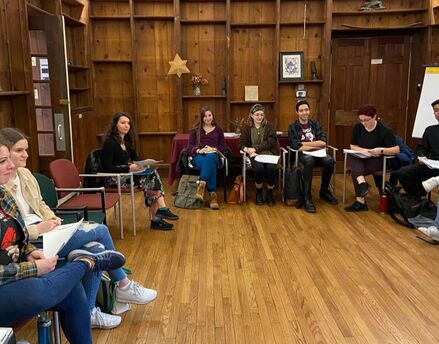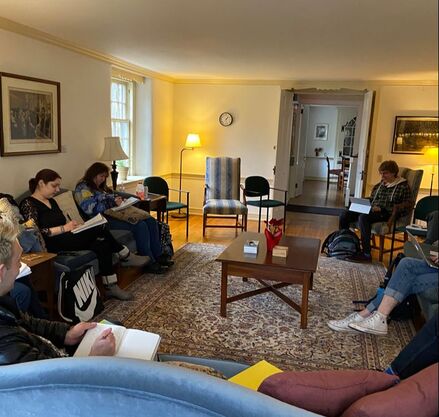 Towering trees, cool breezes, and blank pages. As it turns out, this proves to be the best recipe for creativity. On January 10th-13th, Rowan held its first Writing Arts Winter Writing Retreat. Students who participated in this retreat had the opportunity to engage in writing workshops with professors and authors, share their own work, receive feedback, and speak to an executive editor. All the while, students were staying at a beautiful retreat center, Pendle Hill. Pendle Hill felt like it earned its reputation as a retreat site before the first night of my stay was over. The campus was homey, with enough snaking pathways and eclectic landmarks to pull my legs into a tranquil roam in-between workshops. Aside from a welcoming exterior, Pendle Hill’s hosts were warm and gracious people who would bring with them an air of calm wherever they appeared. The retreat proved to be extremely successful. We were lucky enough to be joined by Dr. Jade Jones, Professor Megan Atwood, Lanre Akinsiku, and Professor Heather Lanier. Each of the professors worked tirelessly to grant us both an educational and inspiring experience. While the modern world may offer a variety of amenities to appreciate, the never-ending flow of information that comes with such amenities often results in a chronic case of distraction and disengagement from the present moment. Pendle Hill’s seclusive campus opened up its arms for all of us students who were looking for a reprieve from the world’s constant noise. Here came a small community of like-minded students and instructors who, for a brief moment in time, leaned on each other and the world around them to do one simple thing: write. Poetry Workshop - Tara I went into the Poetry workshop without much experience in the genre. I have never been great at poetry, and for that reason I haven’t written a lot of it. However, I decided that the only way to improve is to practice it. The only issue was I didn’t know where to start. I knew the Poetry workshop would both challenge me and give me the foundation I needed to begin writing more of the genre. In the workshop, we discussed a form of poetry known as persona poetry. Professor Laneir did a great job of explaining what they were and the different ways they can be written. We then read a few different examples of persona poems, analyzing the meaning behind them as we did so. Among some of the pieces were "Monica Lewinsky Thinks of Bill Clinton While Standing Naked in Front of a Hotel Mirror" by Julianna Baggot and a collection of poems from Patricia Smith’s “Blood Dazzler”. After reading examples of this poetry, we were given the task of writing our own pieces. With the guidance given, I had a much stronger idea of what I wanted to write. After choosing a topic, I began to write, and ended with a poem I was proud of. I think the workshop was helpful to both experienced poets and those like me, who were hesitant to write poetry. I certainly gained a lot from this workshop, and hope to continue working on my skills as a poet. Fiction Workshop - Matt Choosing between the Fiction and Creative Nonfiction workshops was a challenge, but after considering the creative nonfiction work that I had just completed in my Fall 2019 Creative Writing II course, I decided that touching up on my fiction writing skills should probably be what I focused on. Professor Atwood led the fiction workshop, and used her experience as both an author and an editor to help all of us in the room become better at presenting our stories in a way that was engaging and dynamic for future readers. Through different writing exercises given to us during the workshop, we practiced how to see the world in our characters’ eyes; how to create narrative arcs propelled by character development; and how to effectively use world-building methods to provide a reliable spine to your storytelling. I appreciated all of these lessons, but what stuck with me the most was our lesson on the relationship between plot and character. Professor Atwood argued that there is no distinction to be made between plot and character in fiction, because all plots should be actively shaped and interrelated to the desires and flaws of your characters. While I have been advised against creating passive characters who are strung along by the demands of the plot, I have never had an instructor claim that plot and character are not meant to be treated as separate entities. I’ve taken this thought to heart since, and will carry this nugget of wisdom into all of my future projects as a writer. Q&A With Jordan Brown- Tara: One of the most informative and beneficial aspects of the retreat was definitely the opportunity to speak to executive editor, Jordan Brown. Brown works for two imprints of Harpercollins Children’s Books, and his significant amount of experience left students feeling both excited and nervous as we anticipated what he might have to say. Something Writing Arts majors hear frequently is “How are you going to make money?”, and Jordan Brown is an excellent example of how we could use our Writing Arts degree. He first gave us a better idea of what he does day to day. Then he went on to answer some of Professor Atwood’s prepared questions. Afterwards, there was a brief Q&A. We were able to learn about what an editor’s day-in-the-life looks like, how editors begin as assistants, what editors look for in a manuscript, and the process it takes if it is accepted. Brown was extremely knowledgeable and his insight was appreciated by all. Many students jotted down notes as he talked, knowing the information would be useful later. Seeing someone who is passionate about literature and writing just as we are, someone who has been able to make their life about stories, was an inspiring and motivating experience. Group Workshops - Matt One aspect of the retreat that felt incredibly affirming and positive for me was my experience in a group workshop on the retreat’s final day. While my English teachers have usually given me kind remarks on my creative writing, I’ve always harbored an anxiety that other people who wrote creatively or who were in a position to judge me as a peer and not a student would not receive my work well. Reading an excerpt from a short science-fiction piece I had drafted was a nerve-wracking hurdle I knew that I needed to clear to receive the type of feedback from the type of audience I needed to hear from. To my relief the group members had positive things to say about my draft, including Professor Atwood -- a published author herself. After I shared my piece, the other three students in the room went around and read what they had been working on as well. What I was expecting to be a critical takedown of everyone’s work actually turned out to be a welcoming group of people willing to support each other’s efforts and who encouraged bringing positive energy into one’s creative space. I know that there are some people who see affirmations and compliments as coddling diversions that obstruct “real” internal progress, and I also know that I have been guilty of adopting this mindset every so often. But -- as someone who so habitually derides his own efforts -- I think that the group confidence-boost was exactly what I needed to further hone my writing ability.  Final Thoughts: The Winter Writing Retreat ended with an early breakfast and a little over a dozen temporary goodbyes. While the retreat had only lasted about three days, many students were already sharing their hopes that another writing retreat would be offered for the upcoming semester as well. It can be slippery trying to quantify a “success” when it comes to writing -- even more tricky when trying to tell whether an event about writing was successful or not. But the passion for writing was definitely there in every workshop, and every student was willing to engage with and respond to whatever the professors threw at them. The Writing Arts department’s first writing retreat set a clear standard for how future retreats can measure their success. Hopefully this little Pendle Hill excursion will be the first of many more opportunities for Writing Arts students to disengage from their daily stresses and instead find a safe haven to let their writing grow.
0 Comments
Leave a Reply. |
Archives
May 2024
Categories |


 RSS Feed
RSS Feed